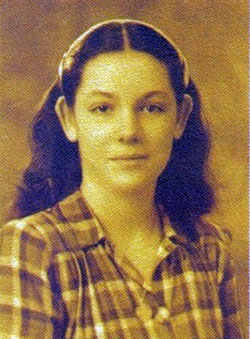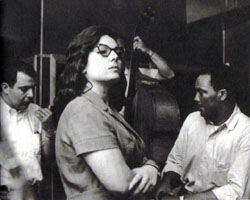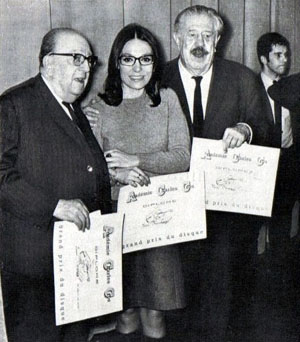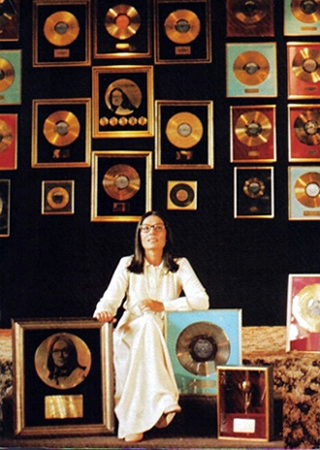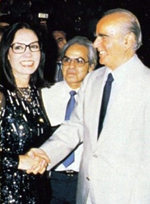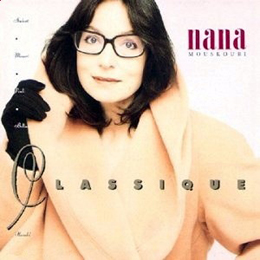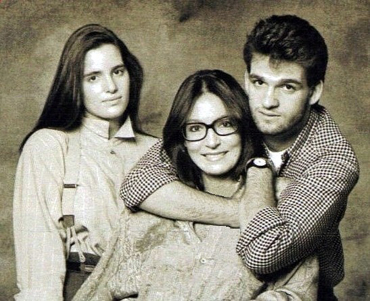A LIFE, A DESTINY
|
NANA MOUSKOURI was born in Crete on October 13, 1934. Being that her father was a projectionist and her mother a worker in the cinema, it was natural that she grew up with songs from the movies and the dream of her mother to become a singer. In the 1940s, her country goes through the occupation and the civil war. The numerous and disconcerting images of horror mould her personality. Introverted and full of complexes, the young Joanna, her real first name, develops a surprising determination.
Everyday, Nana accompanies her father to his cinema. While he's adjusting his projector, she likes standing on the stage contemplating the empty hall. During the reopening of theatres after the war, Nana is ten years old. For the first time, she makes a fascinating discovery; while watching the spectators, she feels that after the projection, they are not the same any more, that the movie had transformed them. A few months later, the whole family attends a musical. During the whole representation, Nana cries, not for the story, but because she would have liked to be on stage. As she sings all day long, her parents decide to enrol her for singing lessons with her sister Jenny. Between the two of them, Nana is the one who will decide to continue.
|
Spending eight years at the Conservatory of Athens to study classical singing permit her to find her vocation and discover that her musical universe is not limited to any one style. In 1956, she makes her beginnings by singing jazz and popular music on the radio. Then, she becomes band vocalist in the tavernas of Plaka. Two years later, after meeting with MANOS HADJIDAKIS, leader of the Revival of the Greek song scene, he offers to compose for her. On October 3rd, 1959, he presents her at the GREEK SONG FESTIVAL where she wins the first prize with "Kapou iparhi i agapi mou". Within a few months, this song makes her the most popular singer in her country.
Gradually, Nana discovers that she is destined for an international career. The singing recital that she presents every evening in Athens clubs becomes more an more multilingual. In September 1960, in Barcelona, during her first trip abroad, she is the favourite at the MEDITERRANEAN SONG FESTIVAL with "Xypna agapi mou". On her return in Greece, she sings on the soundtrack of the German documentary film "Traumland der Sehnsucht", for which Hadjidakis had written the music. After it won a SILVER BEAR at the Berlin Film Festival, the record company Fontana asked Nana to record two of the main themes in German, "Addio" (Athina) and principally "San sfirixis tris fores", which became "Weisse Rosen aus Athen". The disk was a colossal success, with sales exceeding 1,000,000 copies in less than six months.
In June 1962, at QUINCY JONES's request, she flies to New York City. This stay turns out to be like her second musical school since the Conservatory. During the day, she listens to records and during the evening, she goes to Broadway or in the clubs of Harlem and of Greenwich Village. From that trip, will spring her very first album titled "The Girl from Greece sings" in which she sings great American standards, with orchestration by TORRIE ZITO. At the end of the summer, Nana settles in France. She adapts to Parisian life, learns French and German on the fly and succeeds to lose several kilos. In spite of her discretion and her glasses, the young Greek singer feels ready to conquer all the Western European countries. |
|
On March 23, 1963, Nana represented Luxembourg at the EUROVISION CONTEST in London. She sang "À force de prier", a song especially written for the event. This appearance drew her to the attention of the producer of the programme, YVONNE LITTLEWOOD, who a few years later would engage her to host a series of musical programmes on the BBC. Furthermore, HARRY BELAFONTE noticed her and decided to invite her as a guest singer for his new show. Together, from 1964 to 1966, they undertook four tours of both college-campus halls and the major North American theatres. They also recorded an album of Greek songs known as "An evening with Belafonte/Mouskouri". This enriching experience reveals to her that the stage is the place where she lives her most beautiful moments of singer.
|
Following the example of Belafonte, Nana does her first tour alone with her musicians in Quebec in 1967. There, she discovers a little France in America in full effervescence, that lives in its own way its May 1968, the Quiet Revolution. The attachment to this nation will lead her later to record "A place in my heart", a success in seven languages. At the same time, her French songs are having more and more success. The album "Le Coeur trop tendre" earns the GRAND PRIX DE L'ACADÉMIE CHARLES CROS and "Le jour où la colombe...", a first Gold Record. Nana, who chose France as her country of adoption is now considered as a French singer. This success is consolidated on stage, at the OLYMPIA in October of the same year. In the following months, she establishes her main residence in Geneva with her husband, the guitarist GEORGE PETSILAS. It is in Switzerland that their children will be born and raised (Nicolas in 1968 and Helene in 1970). They do not have any more artistic ties with their native land which has just fallen into Colonels' hands. But Nana continues to sing of the Greece which she loves and knew, without pronouncing publicly her views on the dictatorial régime which will last seven years. |
In 1969, "Over and Over", her first record for the English market, was released. It remained on the British charts for over 105 weeks! Its success was immense and Nana could measure her popularity in England by her first concert at the ALBERT HALL in London ("sold out" in a few hours) and her first tour in the country. Thanks to the television shows, which she hosted several times a year at the BBC, from 1968 to 1981, her British career was launched. These series were also exported throughout the Commonwealth and even beyond, making her famous throughout the world. Her diary is planned two years in advance and she gives up to 125 performances per year, whether it is in France, Switzerland, Belgium, England, Holland, Ireland, Germany, Canada, United States, Mexico, in Japan…where she accumulated awards. During her first tour in Oceania, she receives 19 Gold records in Australia and 9 in New Zealand.
After having shared the stage since their beginnings, Nana and her husband decide to pursue their separate ways. George returns to Greece and becomes a record producer. For a few months, Nana shelves her career, but her children convince her to continue singing. In August 1975, she was photographed in front of a wall of Gold records from 5 continents; among them was a rare distinction at the time, a Platinum Cassette. Thanks to "Sieben schwarze Rosen" and "Die Welt ist voll Licht", her two new German albums, she renews her popularity with the audience who awarded her first big success. In France, all her albums obtain gold status. Her records, mainly those in English, are released throughout the world and render her each time more popular. From this moment on, she manages three major careers in three languages.
Nana undertakes tour after tour in Europe and in North America. Her records are selling more and more. In 1979, the firm Phonogram offered her an array of 67 golden disks crowning her 20 years of success worldwide. The following year, in Canada, her album "Roses & Sunshine" became triple platinum. While she won the GOLDEN TICKET for over 100 000 tickets sold in a few days for her German tour in 1981, her new hit "Je chante avec toi liberté" boosted her to the top sales in France.
|
|
|
On July 23 and 24, 1984, after more than 20 years' absence, Nana made her grand artistic return in her own country. She sang at one of the most beautiful settings in the world, the ODEON OF HERODES ATTICUS, at the foot of the Acropolis in Athens. These two unique and memorable concerts confirmed that she still counted in the hearts of her compatriots. Even those who blamed her for her silence during the military junta forgive her. This concert was to remain her most vivid memory. It appeared on disk and video and was the biggest seller of the year in Greece. From that day on she decided to make original recordings in Greek for her Greek audience and she began this exploit the following year with her new album "I Endekati Entoli".
|
During that time, Nana lent her voice to the music of the TV series "Mistral's Daughter". In France, Belgium, and Quebec, the record becomes one of the biggest successes of the year. The English version "Only Love" is launched throughout the world and becomes No 1 in England, Ireland, Holland, Sweden, Finland, Israel, South Africa and Brazil. In 1986, after Spain and Portugal joined the European Community, Nana recorded an album in Spanish and another in Portuguese for the first time. It was a shot in the dark which turned into a master coup, since with "Con toda el alma" she propels to the head of the best sellers in Spain. The same scenario is repeated in Argentina and in Chile with "Libertad". This break into the Spanish-speaking market leads her to record new albums in this language.
While she is at the height of her popularity, Nana decides to surpass herself by working her voice like at the time of the Conservatory, and records an album of classical melodies. The challenge is struck up and the effort duely rewarded. It comes out in some twenty countries and sells millions of copies. With this repertoire, she undertakes a new world tour which begins with a series of recitals at the ZENITH in Paris and by an unforgettable concert at the BARBICAN in London in December 1989.
During the nineties, Nana continued to record regularly in 5 languages: French, English, Spanish but also in Greek and in German. Each album is unique and has its own theme. In September 1991, her compilation "Only Love" came out in the U.S. Hailed by the critics, it sold by the hundreds of thousands. The tours she undertook in America took her from Miami to Detroit, from Los Angeles to Dallas, from Seattle to New Orleans. Wherever she went, the halls were packed.
|
|
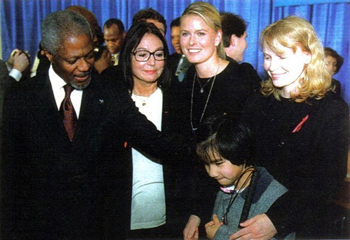 |
From 1993, Nana had to reconcile her career with her engagement as AMBASSADOR AND WORLD REPRESENTATIVE FOR THE PERFORMING ARTS at UNICEF and later on, from 1994 to 1999 with her post as GREEK DEPUTY OF THE EUROPEAN PARLIAMANT. She continued never-the-less to give about forty concerts a year and added Latin America to her tour circuit. Her appointment as Goodwill Ambassador for UNICEF lead her to visit new countries: Vietnam, Kenya, Guatemala, Bosnia, Bulgaria, Russia, Romania and Madagascar, whether it was to give benefit concerts or open their programs. At the Parliament, she worked mainly in the field of Culture, Education and Development. |
Singer of Reference and Woman of Engagement, Nana doesn't count any more the tributes bestowed upon her. In June 1996, in Brussels, the President of the IFPI – International Federation of the Record Industry – presented her with a PLATINUM EUROPE AWARD in honour of her career in Europe and the millions of records she has sold there. At UNICEF's 50th Anniversary Gala, held in Chicago in February 1997, HARRY BELAFONTE presented Nana with the prestigious WORLD OF CHILDREN AWARD for her humanitarian efforts. The same year, on September 11, she was awarded CHEVALIER OF THE LEGION OF HONOUR, at the Palais de l'Elysée by the President of the French Republic, JACQUES CHIRAC.
With the turning of the millenium, Nana makes a new classical album in which she draws from more classical composers, religious and traditional hymns. The mythical album produced by QUINCY JONES in 1962 "In New York - The Girl from Greece Sings" is re-released on CD and finds a second career. While the readers of HMV CHOICE choose it as the best album of the year in the category "Easy Listening", the press describe it as an "overlooked chef d'oeuvre". In Germany, it will be certified five-time golden record. One evening in the summer of 2002, she is the invited artist of the Festival of jazz in Stuttgart. She is accompanied by the big band of Radio Berlin and this unique recital will be released as Nana's very first DVD under the title of "Nana Swings".
On January 13, 2003, Nana and her producer ANDRE CHAPELLE unite their destiny through marriage. They choose to do it in a private ceremony, in the presence of 15 guests including her two children. NICOLAS is a cameraman. HELENE (LÉNOU) is a performer. Moreover, she has been back up accompanist singer for her mother during three years. From 2004 to 2008, Nana does a long Farewell World Tour to thank her audience who is faithful to her for so many years. At the same time, her French, English and Spanish Integrals are released. Each one bears witness of a unique musical heritage legacy for present and future generations.
|
|
